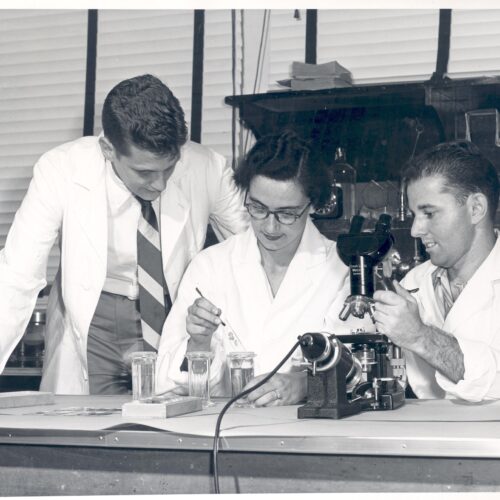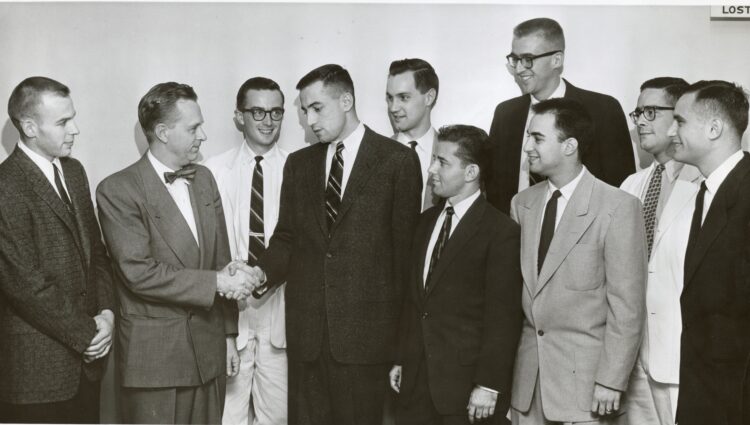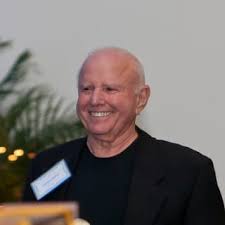A 20-year-old with a brand-new bachelor’s degree from the University of Miami, Gordon Miller, MD ’60, knew he would be a doctor. What remained to be determined was less straightforward: where to attend medical school?
To answer this question, Miller turned to every physician whom he knew in his Miami hometown. The responses—apparently invariably—were the same: Washington University School of Medicine.
This endorsement was sufficient motivation for Miller to hop in his car and drive directly the 18-odd hours northwest to St. Louis. He arrived unannounced, requesting an interview with School of Medicine admissions at the height of the medical application cycle. And, according to a long-term colleague of Miller’s, this request was granted.

VC162089, Bernard Becker Medical Library Archives, Washington University in St. Louis.
In many ways, the meeting that ensued reveals as much about the School of Medicine as it does about Miller. Somehow the conversation between the aspiring applicant and the admissions director turned to literature and, discovering each had just completed the Salinger novel, Catcher in the Rye, the rest of the conversation devolved entirely on that remarkable book. Not on cell biology. Not on anatomy, but on Salinger and his Holden Caufield.
It is easy to imagine, in retrospect, that the admissions director discerned in Miller’s conversation, not merely the scientific drive required of a physician. He also likely noted some other essential capacity—an ability to be moved genuinely by the experience of others—and, in this, the very combination essential to the ideal practice of clinical medicine. And as their discussion continued, with the director as an exemplar, it likewise became clear to young Gordon Miller that WashU was the ideal institution for training toward such practice. He was accepted that same day.
Thus, from 1955 forward, Miller’s enthusiasm for Washington University School of Medicine never abated and he lived out its mission. He retained a vital commitment to service, enlisting as a captain in the army, before returning to complete his internship at Albert Einstein College of Medicine in New York. Moving home to Miami Beach, he became chief resident in ophthalmology at Jackson Memorial Hospital and Bascom Palmer Eye Institute. He went on to dedicate a 50-year career in private practice at Magoon, Miller & Kulvin, delivering pioneering surgical eye care. In fact, Miller was the first ophthalmic surgeon in Florida to specialize in oculoplastic and orbital reconstructive surgery. Given this record, he was tapped to be a Fellow of the American College of Surgeons.


Despite such lofty attainments, the charisma that carried Gordon Miller through that initial WashU interview persisted. He was truly loved by his patients and peers. His outward-facing focus, an abiding interest in the thriving of others, informed substantive philanthropy. And, as the institution that first clarified the deep humanity integral to a research-based, scientific discipline, WashU’s School of Medicine was a recurring beneficiary.
Miller made regular gifts to his medical alma mater. Perhaps the most meaningful among these was a planned gift to endow the Gordon R. Miller Professorship in Medicine and the Gordon R. Miller Scholarship. In this, Miller contributed directly to the continuation of the mission that launched him. His gift supports the innovative research, the mentorship, and the model that produces exceptional clinical physicians not merely for St. Louis, but for the broader society.